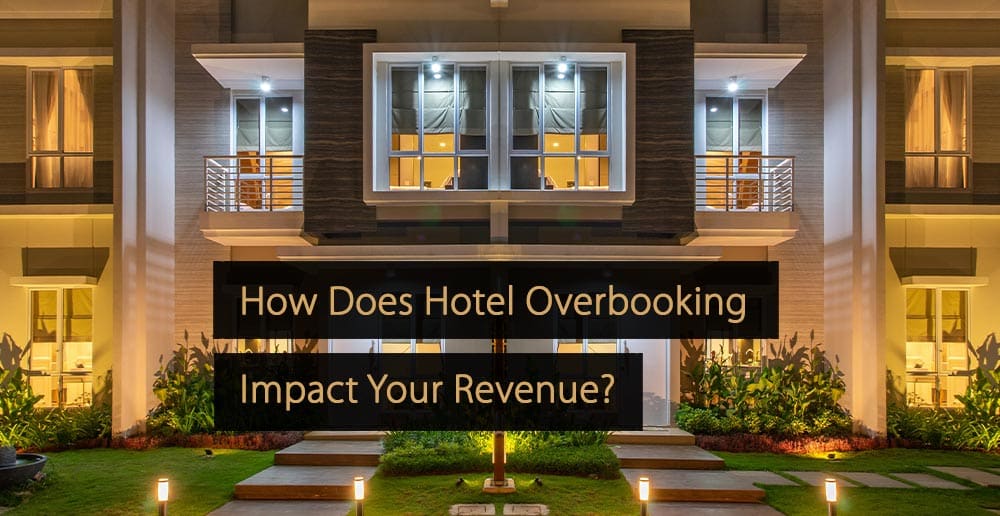Overbooking is a common practice in the hotel industry, strategically employed to secure maximum occupancy and guarantee the sell-out of rooms. While this approach holds undeniable benefits for hoteliers, there are also downsides to it, such as dissatisfied guests in case you get double bookings or missed revenue opportunities from free room upgrades.
Why Do Hotels Overbook: 4 Primary Reasons
When managed correctly and with a few tactics, you can make your overbooking strategy more effective and fruitful. In this article, you’ll find the pros and cons of overbookings and possible solutions to mitigate the risks and maximize revenue.
Overbooking isn’t as counterintuitive as it sounds. Taking a proactive approach to smart revenue management means considering multiple factors that could impact your hotel’s revenue. Below, you will find four primary reasons why hotels find it necessary to overbook:
1. Prevent Lost Revenue from Cancellations
Overbooking is often implemented to mitigate the risk of lost revenue resulting from cancellations. By intentionally booking more rooms than the hotel physically possesses, hotels aim to strike a balance between maximizing occupancy and accommodating potential cancellations.
This strategy acts as a proactive measure to ensure that even if some guests cancel their reservations, the hotel can still achieve optimal occupancy levels. It helps minimize the financial impact of unexpected cancellations on overall revenue.
2. Ensure Competitive Pricing
Another rationale behind overbooking is to maintain competitive pricing within the hospitality industry. Overbooking lets you create a buffer to account for potential cancellations and fluctuations in demand. This way, you avoid inflating room rates to cover potential revenue losses from cancellations and no-shows, keeping your room prices attractive to potential guests.
3. Achieve 100% Occupancy
With an overbooking strategy in place, it’s, in fact, possible to boast 100% occupancy. Overbooking allows you to compensate for potential vacant rooms, ensuring that every room is utilised.
While it involves managing the risk of accommodating more guests than the actual room count, the objective is to maximize revenue and operational efficiency by minimizing instances of unoccupied rooms and achieving full occupancy whenever possible.
4. Meet Revenue Targets
As a hotel, you definitely have revenue targets to meet, and overbooking can help you achieve these goals. By selling more rooms than available and accurately managing cancellations, hotels can come closer to their revenue objectives.
The overbooking strategy helps you ensure that your hotel is better positioned to reach or exceed its revenue targets by minimizing the impact of unforeseen vacancies.
What Are the Downsides of Overbooking?
While overbookings are instrumental for ensuring high occupancy and getting you closer to reaching your financial goals, this practice isn’t perfect. Here’s what you need to be on the lookout for when implementing it:
1. Loss of revenue
Similar to how overbooking can be a strategy to avoid lost revenue, it can also end up causing revenue losses.
While this might sound contradictory, implementing an overbooking strategy may occasionally require offering free upgrades in the case of double bookings.
Typically, lower-tier rooms are sold out first, leaving higher-tier rooms unoccupied. This implies that to accommodate overbooked guests, these higher-tier rooms may need to be provided for free. In fact, revenue managers from 5-star hotel chains reveal that overbooking results in approximately 1,622 EUR lost revenue per room per year.
2. Operational Challenges
Implementing an overbooking strategy at a hotel introduces operational challenges that can hinder efficiency and guest satisfaction. This approach may lead to logistical issues regarding managing room allocations and cleaning schedules.
In addition to that, a well-coordinated effort from the hotel staff is needed to manage overbooking situations. The increased workload required to handle last-minute changes and address guest concerns can strain operational resources and impact staff morale. Mistakes such as double bookings or miscommunications become more likely with a higher volume of reservations. Moreover, the constant need to address overbooking issues may lead to burnout among hotel staff, affecting overall job satisfaction.
3. Guest Disruption
One of the most significant drawbacks is the potential for guest dissatisfaction if the hotel can’t fulfill all reservations. In the worst-case scenario, you might have to accommodate your guests at a nearby partner hotel.
While the accommodation would be similar, guests can be unhappy if they look forward to staying at your hotel specifically. Even if they are flexible about where they stay, some inconvenience will still be involved.
4. Loss of Customer Loyalty
If guests have a negative experience due to overbooking, they may choose not to return to the hotel in the future, losing customer loyalty. Plus, if guests had to be accommodated at a competitor, they could decide to book there the next time they’re in town.
How to Manage Overbookings Effectively and Turn Them Into Revenue Opportunities
The key to making overbookings work in your favor lies in collecting and relying on data and training your hotel staff. Here’s how:
1. Use Data to Forecast Cancellations and No-Shows
Look at your hotel’s booking history. How many cancellations do you receive on average? How many guests don’t take the time to cancel?
For accuracy, ensure that you filter it according to season. Guest behavior can vary significantly between low, shoulder, and high seasons.
In addition to tracking the pattern of no-shows and cancellations across all seasons, you’ll also need to take a look at your finances. If you need to compensate a guest, what would be a fair amount that your hotel could afford? Can you throw in a free meal and massage, or should it be restricted to a complimentary welcome drink only?
2. Train Your Staff to Upsell
The good news is that upselling can help prevent many lost revenue opportunities. Instead of having to give away a high-tier room worth 400 EUR to first-time bookers only because you overbooked, you can upsell it in advance to a loyal guest who is prone to spend more on additional services.
Using pre-arrival or front desk upselling tactics ensures the successful promotion of higher-tier rooms. By effectively upselling these premium rooms, your standard rooms remain available for new bookings, allowing you to attract guests with competitive rates.
When executed consistently and strategically, upselling transforms into a reliable source of ancillary revenue, enabling you to generate the previously mentioned additional revenue of 1,622 EUR per room per year. This holds particularly true if your hotel offers rooms across various tiers, making these proactive strategies exceptionally profitable.
3. Make Sure Your Front Desk Team Knows How to Deal with Overbookings
In addition to training your staff on how to upsell effectively, ensure that they know what they need to do in case of an overbooking. They’ll need to be efficient at record-keeping and communication.
For example, they’ll need to ensure an up-to-date list of guests who might be affected and could need alternative accommodation. They’ll also need to be able to think analytically about this list and know which guests are more valuable to your hotel. For instance, guests already spent on pre-arrival upselling will offer more value. As such, it will make more sense rather to move a guest who hasn’t shown interest in other deals and packages yet.
Then, they’ll also need to be trained on how to communicate in such a situation. For example, informing guests beforehand that no rooms are guaranteed unless they guarantee their arrival can help minimize disappointment.
It’s best practice to create a written policy for dealing with overbookings. Not only will it ensure that nothing gets overlooked, but it will help staff to deal with each overbooking case consistently.
To implement hotel overbooking successfully, you’ll need trained staff who excel at record-keeping and communication, data, and an upselling strategy. When these three are in place, you’re well set on optimizing your hotel revenue.
Free Ebook: 5 Tactics for Turning Hotel Overbookings into Revenue
In the ebook, you will learn 5 ways to minimize the occurrence of free room upgrades and instead convert them into revenue-generating opportunities.
Click here to download the ebook “5 Tactics for Turning Hotel Overbookings into Revenue”.
More Tips to Grow Your Business
Revfine.com is the leading knowledge platform for the hospitality and travel industry. Professionals use our insights, strategies, and actionable tips to get inspired, optimize revenue, innovate processes, and improve customer experience.Explore expert advice on management, marketing, revenue management, operations, software, and technology in our dedicated Hotel, Hospitality, and Travel & Tourism categories.








Leave A Comment